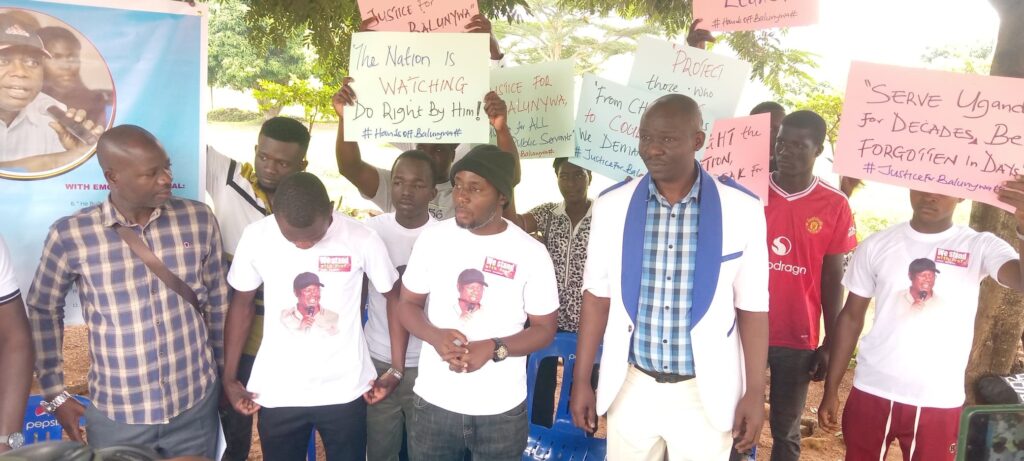At the Ntinda Valley Resort Hotel in Iganga on Wednesday, August 20, 2025, white T-shirts bearing the portrait of Prof. Juma Waswa Balunywa stood out like flags of defiance. The slogan across them—“Hands off Prof. Balunywa”—wasn’t just a fashion choice. It was a declaration of loyalty to a man who, for decades, shaped Uganda’s business education and carved a name that resonates deeply across Busoga.
But the mood wasn’t celebratory. It was tense, urgent, and political. A section of Busoga leaders and residents had convened to defend the former Principal of Makerere University Business School (MUBS), now facing prosecution over alleged irregular recruitment of three staff members.
According to the Directorate of Public Prosecutions (DPP), Prof. Balunywa abused his office between March 18–28, 2023, by hiring an administrative assistant, James Arike, who allegedly lacked the qualifications for the role. Prosecutors say standard recruitment procedures were bypassed—an act that, if proven, amounts to abuse of office.
The charges stunned many who have long seen Balunywa as an institution in himself. For nearly three decades, he was the face of MUBS, credited with transforming the college into a semi-autonomous hub that churned out thousands of graduates. His name is associated with reforms, expansion, and the mainstreaming of business studies in Uganda.
Yet critics have not been silent. Over the years, whispers of patronage, personalized control, and wrangles with the MUBS Council occasionally trailed his leadership. To some, the DPP’s file is not entirely surprising—it is the manifestation of long-simmering governance questions at the school.
But in Busoga, where Balunywa is hailed as one of the region’s most accomplished sons, the charges feel like an insult.
“This is not about one man. It’s about Busoga being undermined,” said Iganga Municipal Council Speaker Sengoba Musa. He demanded that President Museveni intervene, warning of “mass mobilization” if the case is not reviewed.
The LC3 Chairperson of Nawaningi Sub County, Ndhaye Yakubu, was more blunt: “There is a clique of people conniving with outsiders to fight this region. We shall soon be compelled to mention them.”
Civil society leaders at the press conference shared the same frustrations. Abdallah Kasalawo Kikalangafu vowed to take the campaign to the streets. “On Saturday, we shall march across Busoga to show our dissatisfaction. If Busoga is treated as if it doesn’t matter, we must rise to save it.”
For many in the audience, Balunywa’s trial is symbolic. In their eyes, it reflects a wider marginalization of Busoga in national politics and academia. The sense of collective grievance has turned a courtroom battle into a rallying point for regional identity.
Yet beneath the slogans lies a more complex story. Legal analysts argue that university recruitment, though bureaucratic, is prone to manipulation. Questions linger: Was Arike truly unqualified? Did Balunywa, known for his direct style of leadership, overstep procedure? Or is the DPP’s case politically motivated, targeting a man who wielded influence both in academia and politics?
Some insiders at MUBS suggest the latter. “Prof. Balunywa stepped on powerful toes during his tenure,” said a former administrator who requested anonymity. “His clashes with the MUBS Council, his strong personality, and his closeness to certain political circles may have attracted enemies waiting for the right moment.”
In this light, the prosecution could be less about one recruitment file and more about settling scores. The Busoga leaders who gathered in Iganga appear to believe exactly that—that the case is orchestrated to tarnish their region’s best-known intellectual.
To understand the fervor around him, one must revisit Balunywa’s journey. Born in Busoga, he rose through the academic ranks to become Principal of MUBS in 1998. He authored influential works on entrepreneurship, positioned himself as a thought leader on economic empowerment, and mentored a generation of scholars and business professionals.
His tenure was not without controversy. He faced repeated confrontations with MUBS’ governing council, allegations of favoritism, and battles over the institution’s autonomy. Still, his legacy endures: MUBS became a household name for Ugandans aspiring to business education.
To many in Busoga, prosecuting Balunywa is akin to prosecuting their collective pride.
Whether the protests escalate into a large-scale movement depends on the government’s next steps. The leaders’ call for President Museveni to order a review of the DPP’s file has set up a delicate balancing act: respect for judicial independence on one hand, and political calculations on the other.
For now, Busoga waits—and watches. If Saturday’s promised march materializes, it could mark the start of a broader campaign, one that blends legal defense with a quest for regional recognition.
“Today is just the start,” Kasalawo warned. “Busoga must show it will not be taken for granted.”
As the case unfolds, the question looms: is this the trial of a man, or the trial of a region’s dignity?




